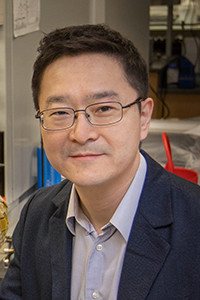Date/Time
Date(s) - 10/18/2022
9:15 am - 10:15 am
Location
New Engineering Building - Room 100
Categories
Hoyong Chung, Ph.D.
Associate Professor
Department of Chemical and Biomedical Engineering
FAMU- FSU College of Engineering in Florida State University
Title: Synthesis of biomass lignin-based biodegradable polymers
Abstract: Lignin is an abundant and low-cost biomass polymer that has a high concentration of aromaticity. Therefore, lignin can be an excellent resource for new sustainable polymers. However, poorly defined excessive reaction sites of lignin lead to thermoset polymers due to uncontrolled crosslinking at its reaction sites. The production of lignin is primarily from a paper industry, where it is disposed of as an unwanted byproduct. In addition to its abundance and inexpensive supply, lignin is favorable for its numerous attractive properties, such as biodegradability, antioxidant activity, high carbon content, high thermal stability, and stiffness. These important features of lignin can be synergistically combined with the advanced functionalities of well-defined poly(ethylene brassylate) via covalent bond linkages. The lignin-based polymer is prepared by two steps: lignin modification to covert hydroxyl group and covalent linkage of lignin and poly(ethylene brassylate). However, there was a serious concern about the linearity of the proposed lignin-based polymers due to lignin’s multiple hydroxyl reaction sites that lead uncontrolled crosslinking. The highly crosslinked polymer does not show thermoplasticity, and therefore is disadvantageous for scalable thermal processing. The talk will discuss solutions of this concern. During the initial lignin modification, the unwanted hydroxyl groups on lignin can be deactivated by capping agents. Then, only very small numbers of hydroxyl group remain in the lignin to avoid unwanted crosslinking. The resulting graft copolymer, poly(lignin-graft-poly(ethylene brassylate)) shows highly controllable thermal properties revealing thermoplastic behavior. In conclusion, the number of carboxylic acids on the modified lignin is finely tuned to yield the low crosslinked (or linear) polymer required to achieve the desired thermoplastic properties.
Bio:
Hoyong Chung is an associate professor at the Department of Chemical and Biomedical Engineering at FAMU- FSU College of Engineering in Florida State University. He has been a postdoctoral scholar in Prof. Robert H. Grubbs’ group at the California Institute of Technology (Caltech). Before arriving at Caltech, Hoyong completed his Ph.D. in Chemistry at Carnegie Mellon University (advisor: Newell Washburn). He received a BS in Polymer Science and Engineering from Kyungpook National University in Korea (2004), and MS from University of Nevada, Las Vegas (2006).
In 2014, Hoyong was hired by FSU university-wide interdisciplinary strategic faculty hiring initiative in energy and materials. His current research interests include 1) synthesis of natural lignin-based sustainable polymers that have stimuli-responsive functionality and biodegradability, 2) the synthesis and study of chemically well-defined functional polymeric adhesives that can be used in biomedical, energy storage, and electronics industry, and 3) development of Ru-based modified N-heterocyclic carbenes (NHC) containing catalysts for ring opening metathesis polymerization (ROMP) and atom transfer radical polymerization (ATRP) in aqueous media. His research expertise in organic polymer synthesis and organometallic catalyst synthesis. His capability as a practical interdisciplinary polymer scientist was proved by multiple patents and peer-reviewed journal publications that are described in his CV and website (https://chy979797.wixsite.com/chunggroup). He has mentored 7 graduate students (5 Ph.D. students) and 6 postdocs while at FAMU- FSU College of Engineering. He plans to continue his research to develop new multifunctional polymers and catalysts relevant to human health and sustainability.

